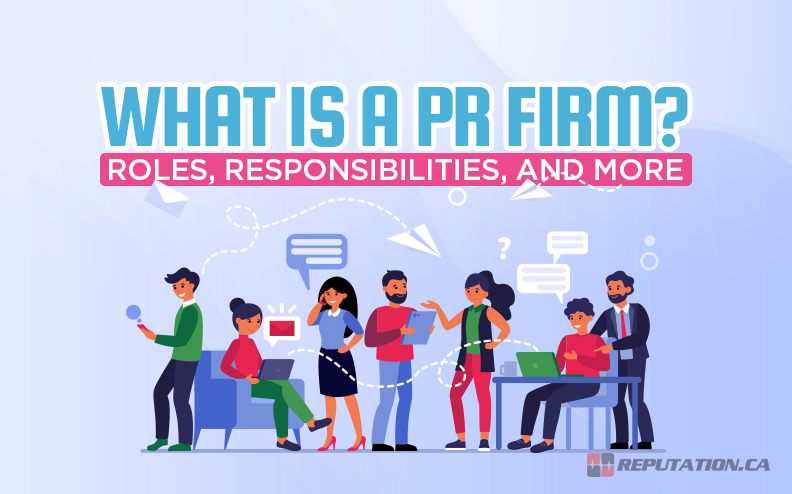If you’ve managed a business of any size, you’ve probably encountered PR firms. Some specialize in working with the largest businesses in the world, like Disney. Others work exclusively with smaller businesses, even those small mom-and-pop shops across the country.
You also might have wondered: what do they do? What, exactly, can a PR firm do for you?
What is a PR Firm, Anyway?
PR stands for Public Relations. As such, a PR firm is a company that contracts with your business and works to manage your public persona. They do this in a variety of ways, from writing press releases to conducting surveys of public opinion. Its main goal is to answer three questions:
- Is the public aware of the company?
- Does the public like the company?
- Does the public trust the company?

We live in a society where there is widespread distrust toward brands. Thus, many brands need to work very hard to achieve some level of personality and personability, to feel more humanized. Brands need to prove they’re worthy of trust, rather than being trusted out of the gate and having to protect that trust.
“A PR firm offers various public relations services, from writing press releases and speeches to conducting market research and helping maintain your brand’s reputation and reach. Whether the client is a company or a public figure, a solid public relations strategy is essential to maintaining a positive brand identity. It involves a wide range of services that all require a unique blend of creative thinking, problem-solving, and the ability to analyze and interpret data.”
PR firms work with businesses that have very little brand awareness and strive to grow that awareness. They work with brands that have a poor reputation and work to build that reputation. They work with brands that have little trust and work to build up trust that may have been lost. PR firms may also be part of “disaster recovery” when negative news breaks about a company, helping to spin and handle a crisis in reputation.
What a PR Firm Doesn’t Do
Before you can learn what a PR firm does, it pays to know what they don’t do.
PR firms are not advertising agencies. PR firms work primarily through editorial content, like blog posts, as well as social media, press releases, and other forms of outreach. They do not manage a budget for paid ads, create sponsored content, or otherwise work the way an advertising agency would work. They also have different focuses: where advertising focuses on brand awareness, lead generation, and sales, PR firms focus on awareness, trust, and reputation.

“PR agencies and advertising agencies share the same goals: promoting clients and making them seem as successful, honest, important, exciting or relevant as possible. But the paths to creating awareness are vastly different. Most people understand advertising is paid for by the client and should be viewed with skepticism. Articles or TV appearances in respected publications have the advantage of third-party validation and are generally viewed more favorably.” – Robert Wynne, Forbes
PR firms are not journalists. While this might seem inaccurate, since a lot of what public relations does is through journalistic channels, PR firms are not themselves journalists. Instead, they work with journalists. They might have connections with editors and writers with major publications. They might focus on press releases, or platforms like Help A Reporter Out, or they might simply bombard tip lines around the world. PR firms do not have journalists on staff (which would be a conflict of interest for the journalists), but they do maintain connections and relationships with journalists and publications.

PR firms are not marketing companies. PR is often considered a subset of marketing. As such, most often, your marketing department will work closely with your PR firm to build an all-encompassing media strategy. Marketing is a wild and complex industry, and PR firms comprise a part of it. Some outreach, press release marketing, and editorial content all come from PR firms but are generally guided by the marketing department to work in conjunction with other marketing efforts. That said, if a PR firm is hired for disaster recovery, it might take a greater level of control.

“The marketing team/person within your company will tend to manage the PR agency and the agency will act as an extension of the marketing team. For many companies, it’s a very useful resource, one that sits outside of your business and this helps with seeing the ‘bigger picture’ – something that can be challenging when you’re in-house and in the thick of it.” – RadioactivePR
PR firms are not (necessarily) reputation management firms. PR firms can have some impact on reputation, and a dedicated PR strategy is often part of an overall reputation management overhaul. PR firms can be part of a reputation management strategy. However, more often you will find that a reputation management company offers PR services in addition to their standard reputation services, as the two are closely tied. That’s what we do.
The Roles and Responsibilities of a PR Firm
PR firms can take on a high-level role, or a low-level role. What do we mean?
At a high level, a PR firm might perform a complete brand overhaul. They come in at the top level of business, and they define what your business does, who your business is, and who you’re trying to reach. Many businesses start and grow without a defined target, and end up wasting time and money in fumbling about. A PR firm can take hold of this aimless mass and refine it into a focused and effective brand.

“Your business offer, audience, objectives, and strategy can all be developed by a PR consultancy. In layman’s terms, this means defining what is it you do, who you want to reach, what you want to achieve, and how you will achieve it. An agency will work with you to drill down to what you want to gain from its support, before planning and delivering work that does just that!” – RadioactivePR
At a low level, your brand might already know what it’s doing and simply need refinement. Like sharpening an old knife, a PR firm can come in and identify what your brand’s identity, goals, and targets are. They then perform research to determine how well aligned you are with those goals and targets, and what changes might need to be made. These changes could be in your brand, messaging, or persona, or they could be focused on your target audience.
How a PR Firm Does What It Does
PR firms have a lot of different tools at their disposal. We’re going to list as many as we can, though bear in mind that some companies do not use all of these. Other firms, like our own, may have other tools and techniques we can leverage outside of traditional PR, such as our reputation management techniques. It varies from company to company. If you have a specific idea of the techniques you want to leverage, you can keep those in mind when you interview a PR firm to see if they’re right for you.
Writing and distributing press releases. One of the core, traditional efforts of a PR firm is creating and submitting press releases. A modern PR firm has to know not just how to create a press release, but where to submit it to get it picked up by the media. The internet is full of “traps” with websites you can use to submit press releases, but which never forward them on to journalists and have no real value in and of themselves. PR firms know how to navigate these waters and get press releases where they’ll be seen.

Writing speeches. Speeches are not always a relevant part of a media strategy, particularly for smaller businesses. However, when they do become relevant, they become relevant very quickly, and a PR firm can create a relevant, compelling speech in a short amount of time. This helps avoid PR disasters or simple misrepresentation from an untrained business leader being forced to speak unprompted.

Writing pitches for journalists. While press releases are a broad-spectrum form of outreach for journalists, pitches are a more intimate, one-on-one form of outreach. A PR firm can identify specific journalists who will be receptive to their outreach – whether it’s because they cover your industry, or because the PR firm already has the relationship – and can create customized pitches for that journalist and their publication.

Creating public outreach events. Much like speeches, events are not always part of the repertoire of general outreach and brand marketing. However, event marketing can be a powerful tool for a business, for awareness, and reputation management. PR firms can develop and deploy small-scale events quickly, to benefit the brand.

Conducting market research. Marketing cannot be performed without data, and PR is no different. PR firms spend a large part of their time researching various ways to determine what public opinion and awareness is and figuring out what kind of messaging your target audience is most receptive to.

Writing for blogs. A PR firm is not a content marketing agency or a blogging firm. However, they can help create earned media – such as guest posting and other forms of outreach – on other websites. Some PR firms may also take up the mantle of blogger for your business, at least until a more proficient blogging solution is implemented.

Influencer outreach and networking. Influencers are, today, nearly as important as journalists when it comes to brand awareness, outreach, and networking. Much like how a PR firm will send out press releases to journalists, they can develop and send out pitches to influencers. This helps build relationships and gather more coverage from the people who influence your target audience.

Social media review and management. Social media is one of the largest channels of influential opinions in the world. People trust the recommendations of others on social media, even if they don’t personally know those others. Thus, a good PR firm spends a significant amount of time monitoring, optimizing, and utilizing social media to benefit the brand.

Crisis management. In cases where an emergent news story, new information, or even a smear campaign occurs, a brand may enter crisis mode. While a reputation management firm will be better than a PR firm at managing reputation, they can both work well in a crisis. When the goal is to suppress negative information, deal with sources, and proliferate positive information, a PR firm can leverage its connections to do so quickly.

Managing corporate communications. Once a business reaches a certain scale, it will be required to communicate at the corporate level. These communications range from interactions with agencies, other c-levels, sponsors, funding sources, and media. PR firms can handle this more robustly than a company that is unprepared for it.

Training for media appearances. Anyone in the company who may be put in front of the media will need to have some level of media training. PR firms can deliver this training to help prevent mixed messages or PR issues.

“With the reach of today’s media formats and the explosion of publications, media training is important for a much larger number of people in an organization. PR professionals are now responsible for training a growing number of executives. Media training is essential for anyone who will be in contact with or in the press.” – Onclusive.com
Building thought leadership and authority. Modern-day marketing centers around expertise, authority, and trust. One of the key ways to build all of this is through thought leadership. Establishing your brand and your executives as experts in your field helps build trust and authority, which can be leveraged to further expand the brand.
Should You Hire a PR Firm?

Is a PR firm the right choice for your brand? The truth is, it depends. In part, it depends on your needs. Do you need public relations, or do you need reputation management? Do you need brand awareness, or do you need focused marketing? Remember, a PR firm has a relatively narrow scope in the grand scheme of marketing, and they won’t do it all for you. If you want a robust solution, however, feel free to contact us and learn what we can do for you.











